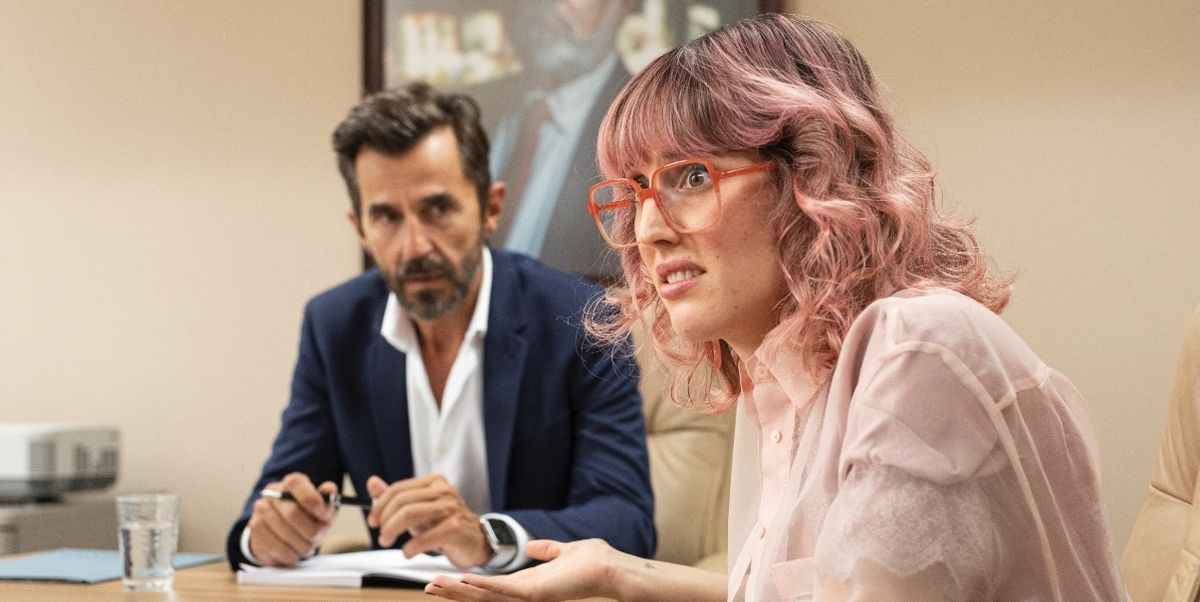We celebrate the premiere of ‘Mirror, mirror’ recalling the best films with metaphorical reflections and secrets hidden behind the myth of Narcissus, do you dare to look further?
What if it were possible to emancipate us from our reflection or, even, that the image decided to leave us alone (as a vampire) fed up with our tedious personality? The director and screenwriter Marc Crehue explore this premise in ‘mirror, mirror‘, with the complicity of a cast (Malena Altherio, Santi Millan, Natalie de Molina, Carlos Areces, Tony Acosta Y Veronica Forque in his latest role) who dares to play costumbrismo with touches of magical realism and social criticism.
A story set in a cosmetics company calculating whether joining the inclusive trend of non-regulatory bodies will boost sales. An initiative promoted by the young youtuber who invites everyone (fat, ugly, trans) to be themselves, without measuring the consequences.
Taking advantage of the premiere of ‘mirror, mirror‘, we remember other cinematographic moments in which this visual element has been used as a metaphor for the double, a vanishing point or a strangeness in the face of identity.
‘The Lady from Shanghai’ (Orson Welles, 1947)
A noir spellbound by the seductive presence of Rita Hayworth What femme fataleas excessive as all of Welles’s work, and despite having remained a classic, it was a complete failure of critics and audiences.
Who’s who in the mirror maze at the San Francisco fair? Nobody forgets this famous and violent final scene in which it is so difficult to distinguish between victims and executioners.
‘Nude Eve’ (Joseph L. Mankiewicz, 1950)
An aspiring actress bursts into the life of a veteran at the height of her fragility with the desire to supplant her… A portrait of the human fauna of the theater, with dialogues of sparkling wit and sharp truth.
Vanity and loneliness multiply in this infinite Eva who has achieved her long-awaited prize. But as Mankiewicz said, “gold, once in hand, becomes trash.”
‘The Apartment’ (Billy Wilder, 1960)
Jack Lemmon and Shirley MacLaine star in this melancholic love story between losers, which we attend with a lump in the throat and a smile, hoping that their card game is still going on.
Lemmon realizes that the elevator operator is his boss’s mistress with this visual detail: the mirror left at her house. The glass is broken and so are they.
‘The Devil’s Seed’ (Roman Polanski, 1968)
Polanski immerses us in the anguished point of view of a woman who is going to be a mother in a film that admits different readings: from the supernatural and satanic thriller, to the metaphor of the loss of identity induced by pregnancy.
Her reflection in the toaster devouring a raw liver brings Rosemary back to her demonic transformation. By the way, Mia Farrow was a vegetarian…
‘The Man Who Fell to Earth’ (Nicolas Roeg, 1976)
A wonderful rarity of the most lysergic and experimental science fiction, where David Bowie plays an alien who, despite his technological superiority, will be the victim of his fierce maladjustment to Earth.
Bowie said that when he made this film he was doing 10 grams of coke a day, and still felt insecure. A depersonalization that has its parallelism in the character itself.
Taxi Driver (Martin Scorsese, 1976)
Paul Schrader’s nihilism, Scorsese’s authorial and nervous gaze and De Niro’s charisma crystallized in a dirty neon noir about a Vietnam veteran taxi driver, insomniac and as full of anger as of good intentions.
Travis points his gun at the mirror: “You talkin’ to me?”. An improvised monologue by De Niro that is film history and ‘meme’ meat.
‘The Truman Show’ (Peter Weir, 1998)
Starring Jim Carrey, the story of a man, Truman, who has lived in a fictional and televised world since he was born, became one of the most disturbing metaphors of the end of the century and a great success with the public.
Truman joked with the mirror every morning, drawing antennae (like a Martian or a 50’s TV), but on the other side there was no intimacy but spectators.
‘Eyes Wide Shut’ (Stanley Kubrick, 1999)
Kubrick said goodbye to cinema with a dark work that, more than erotic, is a psychological investigation of desire and jealousy within a marriage, played by Tom Cruise and Nicole Kidman, who were still married at the time.
As Freud wrote and Durrell quoted in ‘Justine’: “Every sexual act is a process in which four people participate.” This reflection attests to this… which duplicates the couple.
‘Black Swan’ (Darren Aronofsky, 2010)
Natalie Portman won the Oscar for her portrayal of a ballerina haunted by the demands of her director, her mother’s vampirism and her own ghosts. A harrowing (and virtuous) visual exercise by Darren Aronofsky.
The fractured subjectivity of the protagonist takes on a life of its own on the other side of the mirror, where the black swan and his death instinct end up defeating the angelic dancer.
This article appears published in the May 2022 issue of FOTOGRAMAS
Source: Fotogramas
Camila Luna is a writer at Gossipify, where she covers the latest movies and television series. With a passion for all things entertainment, Camila brings her unique perspective to her writing and offers readers an inside look at the industry. Camila is a graduate from the University of California, Los Angeles (UCLA) with a degree in English and is also a avid movie watcher.

